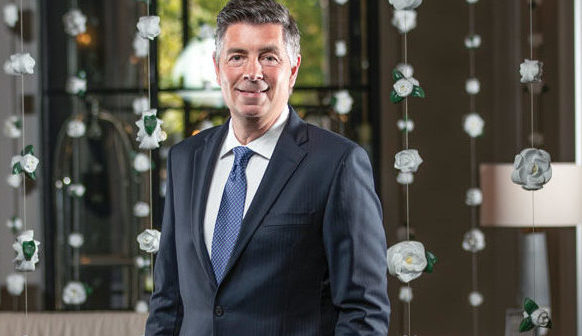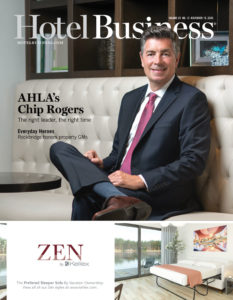Editor’s Note: At the time the November 15th issue of Hotel Business went to press, Congress had not passed a new COVID-19 relief package.
Even before the COVID-19 pandemic hit, Chip Rogers, president/CEO of the American Hotel and Lodging Association (AHLA), was seemingly always working.
“I have always been a seven-day-a-week guy,” said Rogers. “It certainly frustrates my wife. Even shortly after college, I started working on my own. I never really had a clock, never really had a calendar with respect to when I was going to work. I’ve always had the work ethic: Do what’s necessary to get things done. So, I know at times it can be frustrating to those who work around me because I don’t typically keep a normal schedule, and I do like working at night a lot. The late-night phone calls are pretty routine for me. That is just the way I have always been wired, since I was in my 20s.”
Now that the hotel industry is facing what is undoubtedly its toughest challenge ever, Rogers’ work ethic has never been more apparent—or necessary—than the work he is doing advocating on its behalf to the American government, media and people.
In many ways, he has become the voice of the hotel industry, and estimates that he has done 15-20 interviews a week since the pandemic began. “I have probably done at least 300,” he told Hotel Business, in his second of three interviews that day. “I have been on all of the cable news networks. I do a lot of local television and radio as well.”
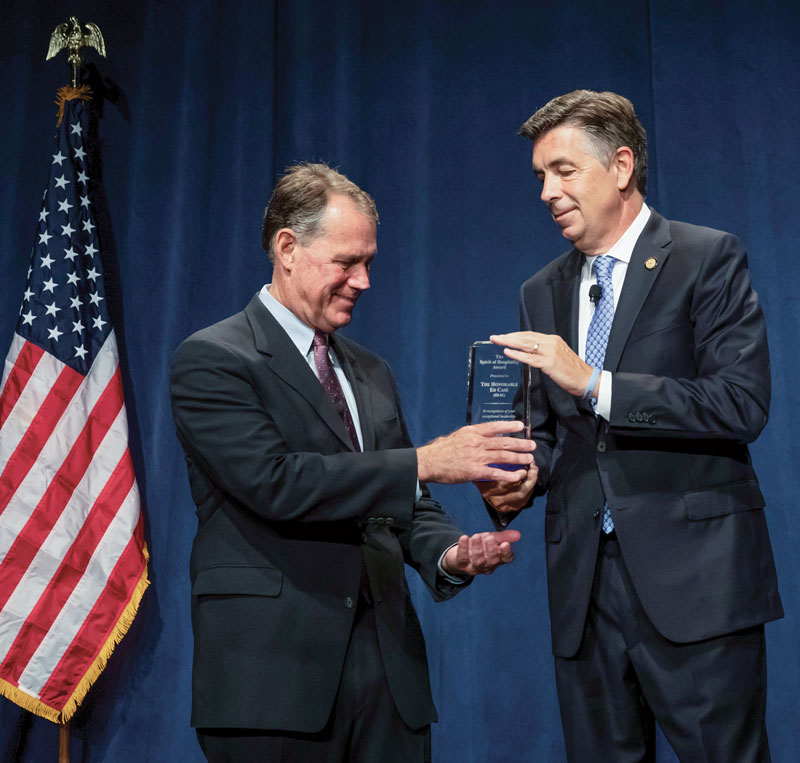
At the 2019 Legislative Action Summit, Rogers presented Rep. Ed Case (D-HI) with the Spirit of Hospitality Award.
Rogers and his staff have spent countless hours advocating for the hotel industry to Congress and other government officials about the dire straits caused by the pandemic. “When I look across the landscape, you can see the numbers of revenue down 50% in urban markets, and 1.9 million jobs lost in our industry alone,” he said. “Those are devastating, but what both concerns me the most and what drives me the most are the personal relationships that I have with people who I know have built their businesses from small to medium to large businesses, and have put their entire life’s work into it. To see some of those businesses crumbling because of this, seeing people actually lose their life’s work, that is the most difficult thing to deal with.”
Advocating for the industry right before an election was challenging. “It is very frustrating because during election time, you see the worst of our system,” said Rogers. “You would think intuitively that people are going to respond to the voters. But what we are seeing now, we really just need some serious leadership across the board. To know that thousands of small businesses are closing their doors—you can see the unemployment, millions of people remain unemployed or at a minimum underemployed. Yet our elected officials care more about the election than anything else. That is troubling and it should trouble the whole country. These are not normal times.”
He said the Congress members on both sides of the aisle understand what the industry is going through, but they haven’t acted to help solving the problem. “Yes, at the beginning of the pandemic, they passed the CARES Act, which was helpful, but back then, we all thought the problem was going to last eight to 10 weeks, and the solution that they provided was an eight- to 10-week solution,” he said. “Now we are seven months into this and there has been no follow up to the CARES Act. The reason there hasn’t been follow up is purely partisan politics. That is unfortunate because the American people deserve better and they deserve better leadership.”
The nation has become polarized, and Rogers has a way to help end that. “The best way to solve it is for people to stop watching cable news—and I mean that honestly because what we have done as a nation is that we have allowed ourselves to only think inside of an echo chamber,” he said. “We have turned the other party into bad people, which is really not what this country is about. The parties are more worried about getting a primary election than they are about the general election. They tend to move further right, further left, and the chance for compromise is very minimal.”
While his work on behalf of America’s hotel industry keeps him busy, he does find time to spend with his wife Amy, four children and his dog Mac. “I have always been good at not letting the stress get to me too much,” said Rogers. “I would be dishonest if I didn’t say there are those moments when it happens to everybody. But Mac and I go out walking a lot. I’ll probably walk with him a good three or four times a day. Even if I get a 20-minute break, we will go out on a walk, so that is nice. We have a creek in our backyard with trees all around, so we are a little secluded. It is nice to put the phone down and stand outside for a few minutes. That’s been good.”
He is also an avid sports fan—both college and pro—and enjoys watching his kids play. “My daughter plays soccer, and so I go to her soccer practices, usually once or twice a week,” he said. “That is a really welcome distraction because either I am walking in the park or I am watching her play, but I try not to focus on business at that moment.”
Serving as president and CEO of AHLA is more than just a job to Rogers. “I love the industry,” he said. “I love the people in the industry. I love the story of the American Dream that is so prevalent in the industry. I think it is very unique in our country now and that is why I like to be part of it.”
He continued, “You take a group of people who barely speak the language, have very little financial resources when they arrive here and very few political connections. All they have are family connections, and they are able to build a business and really make it in this country. That is why we fight so hard to preserve that the next generation of people can do that as well, no matter where they come from. They could be from here, or they could be coming from somewhere else, but that opportunity needs to be there.”
He welcomes the responsibility that his position and this pandemic has brought him in advocating on behalf of the hotel industry. “I love the industry so much and want to make sure there is opportunity for everybody—not only those who work in it, but travelers and guests as well,” he said. “I want that opportunity to be protected and expanded, which is why I love being a voice for the industry.”
Rogers knew that taking on his role at AHLA would be important, but not as important as it has become. “I didn’t know that we would be thrust into the limelight because of the difficulties we are facing,” he said. “We started 2020 on an 11-year run of increasing profits, and RevPAR and occupancies at historic highs, so no one could have ever predicted this. I certainly would have never wished this, but by the same token, I am glad I am here at this time because I think I can help on the leadership side.”
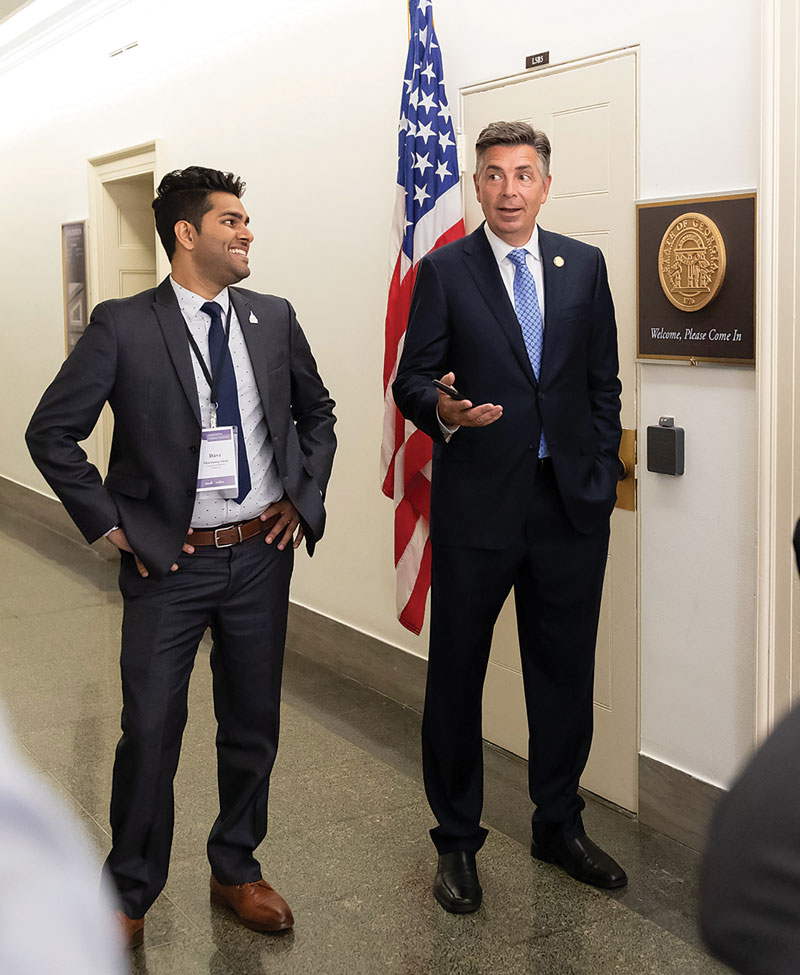
Dave Shah, Pineapple Capital Group (left), and Chips Rogers, AHLA, at the Legislative Action Summit in 2019
Rogers caught the bug for public service when he was young. “I remember when I was in middle school, I was chosen to represent Ronald Reagan in the 1980 election for my school,” he said. “I went to middle school just outside of Atlanta and, at that time, Jimmy Carter was president of the United States and from the state of Georgia. I was chosen to represent Reagan and we had a school debate where two other candidates, one representing Carter and one representing John Anderson, had a debate in front of the entire middle school.”
The students in the audience voted and Reagan won. “I felt that if I could win that election in Carter’s home state, then maybe it was something I should consider,” he said.
After graduating from Georgia Tech and receiving an MBA from Georgia State University’s J. Mack Robinson College of Business, Rogers then spent several years working in communications and broadcasting.
That time in broadcasting helped him in his career. “It had a very positive influence,” he said. “I was quickly identified as a person who people wanted to speak with to promote certain ideas. Working in and around communications was very natural to me. I am one of those rare people that actually enjoys public speaking. I don’t get nervous about it. I never have, even as a child. I remember speaking in large groups and it just never bothered me. I am not sure why that is. It was not anything I did, it was just something I guess I was born with. Communication and public speaking were very natural from a very early age and that certainly helped me through my career in many ways, even to this day.”
Rogers first ran for elective office in 2002, serving in the Georgia House of Representatives from 2003 to 2005. He then served in the Georgia Senate until 2012, with two terms as its majority leader. “I did it for a decade and enjoyed it, but I think public service is something you do to give back; it should not be your career,” he said. “After 10 years, I decided that was enough.”
It was during his time as an elected official that Rogers was introduced to the hospitality industry through AAHOA, which is headquartered in Atlanta.
“AAHOA actually approached me when I was in office because I was working on a piece of legislation to rewrite the property tax law, which was very helpful for hoteliers,” he said. “Once I got to know the industry better, know the people, and just the incredible outlook on life that our industry has through hospitality, it really drew me in.”
He advised the association while serving as an elected official. “I was not a staff member, but I did advise AAHOA on its government affairs strategies, who they needed to speak to, and what issues were most important to the industry,” he said.
After serving as an advisor and VP, government affairs and public relations, he was named AAHOA’s president and CEO in 2014. “I went to work in what I think is the best industry in America, and that is the hospitality industry,” said Rogers. “I think that is what drives me because the difference between this industry and others is so stark. The hospitality industry is truly about serving people every single day. Getting the chance to be one of the leaders of the industry who does that inspires you and it makes you feel like you’ve accomplished something. Most importantly, you get to work around some really good people. That makes it all enjoyable.”
In January 2019, he joined AHLA. “When I was at AAHOA, we worked very closely with AHLA and I had a really good relationship with Katherine Lugar, and still do to this day, even though she is in another industry,” he said. “She was a great leader at AHLA, and we worked very closely together. When she told me she was leaving, I knew that obviously the association was going to have to fill a large void. I really didn’t think that much about it. I was certainly happy where I was. They approached me and we talked about the opportunity, and after considerable discussion, it began to make sense.”
Rogers decided to expand on Lugar’s work when he joined the organization. “What Katherine was able to do was really focus AHLA on the primary role that the association serves—and that is to advocate on behalf of the industry,” he said. “That is, and will always be, what we do best. But I also think there are a lot of other opportunities where industry leadership can go beyond just advocacy.”
He continued, “Clearly, during this pandemic, that is what we are solely focused on. But, prior to the pandemic and then at some point after this, there will be other things where we can help lead the industry through education and training and, specifically, around workforce opportunities. We were beginning to do these things, and we will resume doing them once we get past this challenge.”
The AHLA strives not to be just an industry leader, but a global leader. For instance, stopping human trafficking is important to the organization, as is being a source of information and education for the industry and beyond.
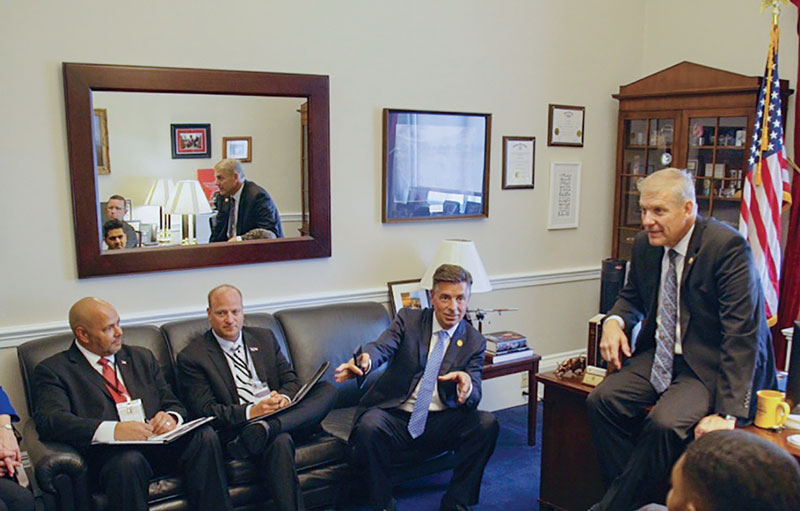
Rogers has advocated on behalf of the hospitality industry for COVID-19 relief. He met with Rep. Barry Loudermilk (R-GA), among others, during last year’s Legislative Action Summit.
Rogers is bullish on the hotel industry’s ability to return strong after the challenge of the pandemic. “I think, ultimately, we won’t return to 100% normal, but very close because I think it is just human nature that people want to be with other people,” said Rogers. “People enjoy travel. Coming into the pandemic, the buzzword over the last three or four years was experience. People are looking for those experiences. I think we will return to that.”
He said he sees the return being predicated on three things. “It is the vaccine, which I believe will be successful and it is going to happen soon,” he said. “Therapies have already been successful in many ways. We know a lot more now than seven months ago, and the ability to treat people now is so much better than it was then.”
The last thing is testing. “I think this is what is going to help our industry most in the short term—the ability to test people for very little cost and have the results almost instantly,” he said. “That technology is here, we just have to get the production up so that we can get the costs of these tests down to a couple of dollars. But if you are able to test people and know the results in five minutes, and it only costs you $2 to test them, that opens up the whole world again—international travel is available and no one has any fear of getting on a plane. I don’t think they should now, but they certainly won’t then. Hotels, restaurants, everything opens up again if we are able to test people.”
Rogers said that at the end of his career, he hopes to have many things to be proud of, but one area will stand out. “I look back at my time as a public servant, and think about the laws I wrote that I know are improving people’s lives,” he said. “But I think I would look at my career in its entirety and, hopefully, be proud of everything I have accomplished. I also recognize that the relationships that you have built through these processes are probably more important than the actual things you accomplish. I am very happy with that. I have built a lot of lifelong friendships in all of my endeavors, which is nice.” HB
Industry praises Rogers’ leadership
In his time with both AAHOA and AHLA, Chip Rogers has met and worked with many in the hotel industry—from families who own a single hotel to heads of major industry brands. Hotel Business reached out to them for their thoughts on his leadership.
Cecil P. Staton, who followed Rogers as CEO/president of AAHOA, has known him since 2002. “We served in the trenches together,” he said. “Both of us were Georgia state senators. We were elected in the very same year.”
The two have worked closely together now in their efforts on behalf of the industry during the pandemic. “One of the things that really pleases me about this industry is that there is a synergy and certainly a commitment to working together for the betterment of all aspects of this industry,” he said. “So, the partnership that we have with AHLA, with the U.S. Travel Association, with the brands, the U.S. Chamber, and many other organizations who advocate in this space, is just very important. Rarely are we ever at odds. Rarely do our interests diverge and we find ourselves in different corners. We work collaboratively.”
From their work over the years, Staton has seen Rogers’ leadership skills firsthand. “He is a great leader,” he said. “He has boundless energy. He has a keen insight. His leadership in all of the work we have undertaken this year has been incredibly important. But he is also a team player and we work together very closely. We talk at least every week or two and we make sure that we are aligned in advocacy we are undertaking.”
He continued, “His leadership is invaluable, and I consider him a trusted colleague and friend. In my experience in politics, and no less in business and in the hospitality world, there is no one I would rather have in the trenches with me for a battle than Chip Rogers.”
Arne Sorenson, president/CEO, Marriott International, called Rogers a champion of the industry. “Chip is a guy that gets to yes,” he said. “We brought a challenge to him around mask wearing—that our hotels were struggling to keep up with the patchwork of face-covering rules in various jurisdictions and having to act as the enforcer, which was extremely challenging for our frontline associates. We called Chip and asked what he thought about the industry coming together to mandate masks to keep our associates and guests safe—he jumped on it and a few weeks later, we had a major industry announcement. That wouldn’t have happened without his leadership.”
Rogers has the ability to bring people with different viewpoints together to form a consensus. “When you think about our industry…all of the issues in the industry do not create alignment of all the members,” said Jon Bortz, president/chairman/CEO, Pebblebrook Hotel Trust and current chair of the AHLA board. “We have different constituencies within our membership. We have brands. We have owners. We have operators. And we have affiliated groups. Sometimes on issues, there are different perspectives. I think he does an incredibly professional, respectful job collaborating with the groups to gain consensus.”
He added, “He is a consensus builder and he recognizes that our industry is stronger together when we all agree, than when we don’t. Being able to pull everybody together when there may be some strong differences of opinion is a testament to the way he has approached his job.”
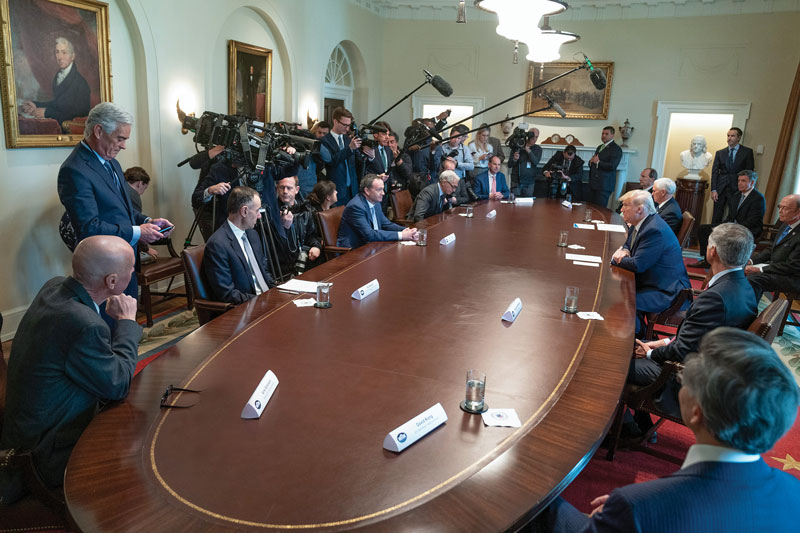
Rogers was part of a contingent of hospitality executives who met with President Trump at the White House during the early stages of the COVID-19 pandemic.
Sorenson agreed with this assessment. “Chip realizes the power we have when we come together and isn’t afraid to leverage it, even if it means he’s got to do some convincing along the way,” he said. “The industry face-covering requirement is a good example. The industry needed a unified solution to a collective problem—one no brand or company could effectively tackle it on its own. Our work on advocacy is another good example—we’ve had dozens of calls with owners, my peers and Chip talking to members of Congress and the Administration about the need for another round of economic stimulus. On those calls, Chip can uniquely relate to their political calculus, helping to steer us accordingly, so we’re more effective.”
Dave Johnson, CEO, Aimbridge Hospitality, was on the AHLA committee that hired Rogers. “The minute we met Chip, we knew he was the right individual for the job,” he said. “Boy, he has stepped up and provided unbelievable leadership. The reality is what Chip and his team have done in response to our entire industry, whether you are big or small, brand or owner/operator, has been just unbelievable. They seemingly work 24/7. I am closer to it, obviously, being an executive committee member of the board, but I cannot say enough great things about Chip and his team as they continue each and every day to be the spokesperson for our industry both to government and folks in general. He has just been a champion for our industry.”
Johnson also praised Rogers’ management style. “Chip has a management style that is extremely inclusive of his team,” he said. “Their opinions are very valued. They feel appreciated as they work for him. Obviously, for all of us, that is very important. You have to let a CEO do his or her job. It is not our job as a board to do it. The way that he won the team over and they won him over, I was very impressed by that, and the team continues to get stronger.”
Bortz liked the newfound intensity he brought to AHLA. “We really ramped up the amount of activities that we were involved in, including instead of being defensive, being offensive and bringing the industry together on major initiatives, such as the Five-Star Promise or No Room for Trafficking. Things like that really helped bring the industry together, and also bring us together with city and state authorities who had the same interests in those issues.”
He added, “Chip is tireless and relentless, and he couldn’t do that without the incredible team he has at the association, much of which was built by Katherine Lugar. People have accepted more responsibility. They have really stepped up to the plate as needed with the devastation to our industry and the need to advocate on behalf of members who are in really desperate straits. The kudos he has gotten from everyone in the industry is remarkable. I get people who I don’t even know, who I have not met, who I have met once, who call me and say, ‘Hey, AHLA is doing an incredible job. Chip Rogers and the team—Rosanna Maietta [EVP, communications & public relations, president, AHLA Foundation] and Brian Crawford [AHLA’s EVP of government affairs], and every one of the people there—are doing and incredible job.’ But that is culture. That is what leadership is about: creating that environment and that culture, and everybody has stepped up there.”
Chris Nassetta, president/CEO, Hilton, said the hospitality industry is lucky to have Rogers at the helm of AHLA. “I’ve known Chip for many years, and he’s always been an incredible leader and advocate for our industry. In a year that’s been unlike any other, Chip’s sharp insights and the relationships he’s built have been invaluable as we sought government support for our owners and team members.” —Gregg Wallis

